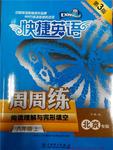题目内容
Farley worked for the Canadian government. One day, he was ___ to learn more about wolves. Do wolves kill lots of caribou(北美驯鹿)? Do they kill people?
They gave him lots of food and clothes and guns. Then they put him on a plane and took him to ____ . The plane put him down and went away. There were no houses or people in this place. But there were lots of animals and lots of wolves.
People tell terrible stories about wolves. They say wolves like to kill and eat people. Farley remembered these stories, and he was ____. He had his gun with him___ .
Then one day, he saw a group of wolves. There was a mother wolf with four baby wolves. A father wolf and another young wolf lived with them.
Farley watched these wolves every day. The mother was a very ____ mother. She gave milk to her babies. She gave them lessons about life. They learned how to ____ food. The father wolf got food for the mother. The young wolf ____ the children. They were a nice, happy family—wolf family! Farley did not need his ____ any more. In a short time, he got on well with the family. Farley watched them for five months. He learned that many stories about the wolves were ____. Wolves do not eat people, and they do not eat many large animals. And he also learned bad things about men. It was men who killed many caribou and wolves.
Later, Farley wrote a book about wolves. He wanted people to ____ them and not to kill them.
They gave him lots of food and clothes and guns. Then they put him on a plane and took him to ____ . The plane put him down and went away. There were no houses or people in this place. But there were lots of animals and lots of wolves.
People tell terrible stories about wolves. They say wolves like to kill and eat people. Farley remembered these stories, and he was ____. He had his gun with him___ .
Then one day, he saw a group of wolves. There was a mother wolf with four baby wolves. A father wolf and another young wolf lived with them.
Farley watched these wolves every day. The mother was a very ____ mother. She gave milk to her babies. She gave them lessons about life. They learned how to ____ food. The father wolf got food for the mother. The young wolf ____ the children. They were a nice, happy family—wolf family! Farley did not need his ____ any more. In a short time, he got on well with the family. Farley watched them for five months. He learned that many stories about the wolves were ____. Wolves do not eat people, and they do not eat many large animals. And he also learned bad things about men. It was men who killed many caribou and wolves.
Later, Farley wrote a book about wolves. He wanted people to ____ them and not to kill them.
| 小题1: |
|
| 小题2: |
|
| 小题3: |
|
| 小题4: |
|
| 小题5: |
|
| 小题6: |
|
| 小题7: |
|
| 小题8: |
|
| 小题9: |
|
| 小题10: |
|
小题1:B
小题2:C
小题3:A
小题4:B
小题5:B
小题6:C
小题7:D
小题8:C
小题9:B
小题10:D
试题分析:本文讲述一位叫做Farley的加拿大政府工作人员为了了解更多有关的狼族的事情,和狼族待在一起一段时间。而后发现狼并不是人们想象的那样,以此文告诉人们不要在杀害狼。
小题1:考查动词及语境的理解。句意:有一天,他被告诉了解多一些有关的狼的知识。A. seen“看见”;B. told“告诉”;C. heard“听”;D. found“找到”。结合句意,故选B。
小题2:考查短语及语境的理解。句意:然后他们把它送上飞机去了一个很远的地方。根据后文There were no houses or people in this place.可知答案为C。
小题3:考查形容词及语境的理解。句意:Farley记住了这些故事并很害怕。A. afraid“害怕的”;B. happy“高兴的”;C. angry“生气的”;D. tired“累的”。结合上文People tell terrible stories about wolves. They say wolves like to kill and eat people.可知答案为A。
小题4:考查短语及语境的理解。句意:他一直拿着枪。A. at times“有时”;B. all the time“一直”;C. once a week“一周一次”;D. every afternoon“每个下午”。上文提到Farley很害怕,所以一直拿着枪。故选B。
小题5:考查形容词及语境的理解。句意:这个妈妈是个好妈妈。A. bad“坏的”;B. good“好的”;C. hungry“饿的”;D. thirsty“渴的”。根据后文She gave milk to her babies. She gave them lessons about life.可知答案为B。
小题6:考查动词及语境的理解。句意:他们学着如何得到食物。A. cook“做饭”;B. make“使,让”;C. get“得到”;D. pick“摘,采”。结合句意,故选C。
小题7:考查动词短语及语境的理解。句意:狼崽和孩子们玩。A. shouted at“对……喊”;B. looked into“调查,观察”;C. laughed at“嘲笑……”;D. played with“和……玩”。结合句意,故选D。
小题8:考查名词及语境的理解。句意:Farley不再需要他们的枪了。A. food“食物”;B. clothes“衣服”;C. gun“枪”;D. plane“飞机”。根据上文In a short time, he got on well with the family.“短时间内,他和这个家庭相处的很好。”可知不再需要枪了,故选C。
小题9:考查形容词及语境的理解。句意:他了解了许多有关狼族的真实的故事。good“好的”;true“真实的”;easy“容易的”;clear“清楚的”。结合句意,故选B。
小题10:考查动词及语境的理解。句意:他想要人们理解人们并不要杀害他们。A. grow“成长”;B. have“有”;C. teach“教”;D. understand“理解”。根据上文Farley对于狼的了解,发现他们并不是人们想的那样,因此写一本书让人们理解。故选D。

练习册系列答案
 快捷英语周周练系列答案
快捷英语周周练系列答案
相关题目
